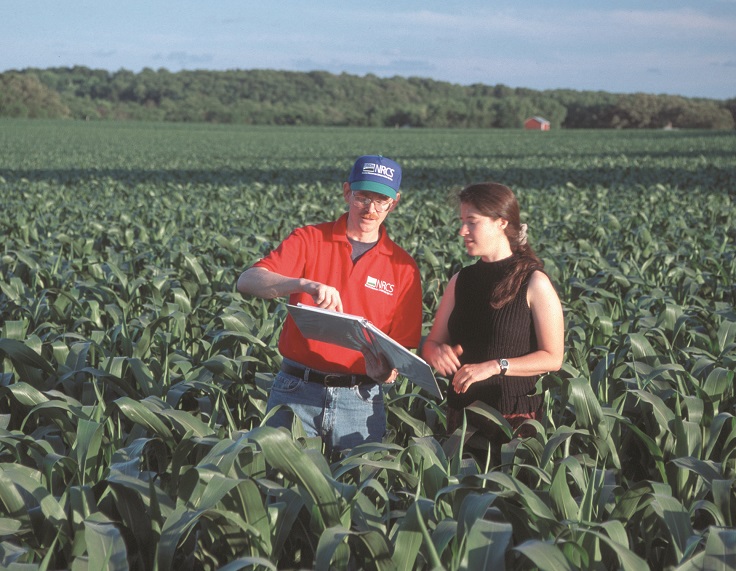Farmers, Agriculture, and Impacts on our Food Supply

May 28, 2020
After being concerned about having household disinfectants, paper towels and toilet paper on hand, many Americans worried about our food supply and related food production and distribution chains. Such concerns have highlighted several long-standing issues about the way we grow food and other agricultural products both in the US and world-wide. Center affiliates have been contributing to this conversation through individual and group engagement through various publication outlets and new research projects.
Professor of Forest and Natural Resources, Linda Prokopy, representing a larger group of researchers from across the Midwest and Center affiliates and collaborators from Purdue (Steve G. Hallett, Ian Kaplan, Sarah LaRose, Michael J. O’Donnell, Kara Salazar & Aaron W. Thompson), has added to this pertinent discussion of our agricultural systems through a recent publication, “The urgency of transforming the Midwestern U.S. landscape into more than corn and soybean.” This article, part of a special collection of essays on Agriculture, Food & Covid-19 published in the journal Agriculture and Human Values, discusses how to advance sustainability goals, build the adaptive capacities of rural communities, and strengthen resiliency against the system shocks if we are able to “increase the diversity of agricultural systems at farm, landscape, and market/supply chain levels so they are more resilient for farmers, rural communities, and the environment.”
Also addressing agricultural production, on both national and global scales, Assistant Professor of Anthropology, Andrew Flachs, urges a revisioning of agriculture production in his recently published article, “Essential Agrarian Histories for Essential Agrarian Futures,” published in Society for the Anthropology of Work. Flachs argues that the radical roots of alternative institutions need to be recovered if we are to emerge from this crisis with a more just and vibrant food system. More specifically, he explores the development of industrial food practices and how many of those who labor to provide us with food in the U.S. are also those with the least access to food and health security, a disconnect underlined and exacerbated through the Covid-19 pandemic. However, he also notes that, “[t]here is reason for both hope and caution. Alternative food systems have historically made headway during such crises and provided new ways to organize labor and food production…” as the significant disruptions to the systems in place for decades has led to the creation of opportunities and alternatives that could lead to a more just system for those laborers who support the production of food in many forms.
Flachs has also recently joined Assistant Professor of Agricultural and Biological Engineering professor Ankita Raturi and her team to engage with farmers who had had to change their relationship with the food supply chain during the pandemic. The goal of their current qualitative research study, “Informatics for Community Food Resilience” is a research and relief project, where the team takes a farmer-centered and community-driven approach to the design of community processes and digital technologies. As a whole, they seek to support coordination and collaboration among food producers and consumers within our communities, both during the COVID-19 pandemic, and beyond. They are investigating information challenges faced by US-based farmers currently engaged in direct sales to consumers or who need to pivot to direct sales due to the COVID-19 pandemic. Their research findings will inform the design of a community food resilience toolkit consisting of digital tools and processes for farmers and consumers for local coordination of food production and distribution. This work reflects the larger work of Raturi’s Agricultural Informatics Lab. More on their work is available in the team’s concept note, available here.
Whether or not we are able to make some changes in our relationships to producers, our agricultural landscape and our business practices remains to be seen, but our engagement with these important challenges remains ongoing at the Center.
Author: Lynne Dahmen
